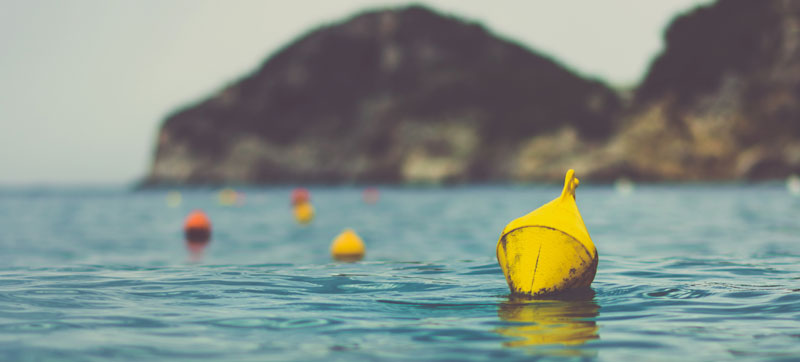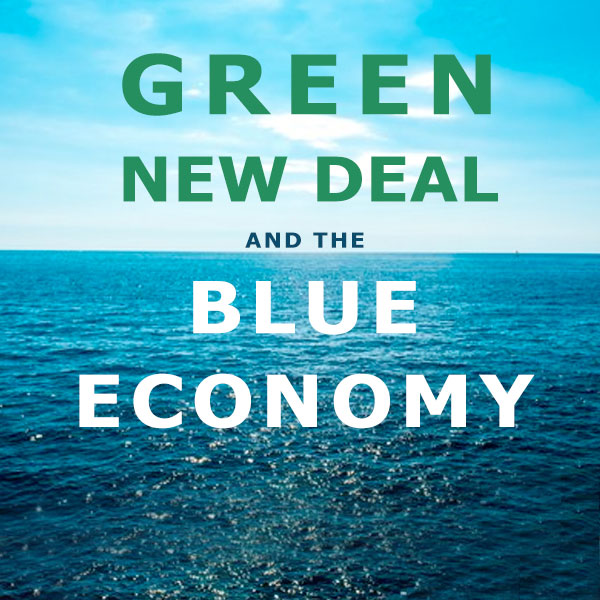Seeking solutions on land without seeking solutions at sea is a failed strategy from the outset.

The politics of response to the impacts of changing climate is a powerful and perverse reality in the global conversation about how we invent the future. In the United States, the dialogue seems paralyzed, or worse, in that leadership seems determined to perpetuate dependence on coal, gas, and oil, the very process that has contributed so directly and deeply to the challenging circumstance we face on so many levels worldwide.
One response has been labeled the Green New Deal, an integrated, progressive strategy directed toward development of alternative energy systems, shifted government subsidy and investment in change, novel financial structures and instruments, and programs that change response through re-directed economic, educational, vocational, employment, and social behaviors. The process will be fraught. How will this affect the ocean?
A recent paper from The Ocean Foundation, authored by Mark J. Spaulding and Angel Braestrup, addresses an answer to that question — how the green new deal integrates with the best desired practices and changes for the ocean. How does the blue economy contribute necessarily to what can be reasonably be deemed a strategy for survival?
As the ocean absorbs so much of the causes of climate change and comprises some 71% of the earth’s surface and is a determinant for both atmospheric condition and the land-based water cycle, it is simply not possible to expect a green political agenda to succeed without an ocean awareness, strategy, and implementation — indeed, a blue economy.

Specifically, Spaulding and Braestrup argue the point as follows, “the blue economy vision and potential strategies should not be overlooked in developing the key elements of an overall more sustainable economy that opens new areas of opportunity while improving elements of our existing economy that support our overall vision of a healthy ocean, and thus healthy human communities.” They focus on three areas for such opportunity: shipping, energy production, and food security.
Shipping remains the most direct, efficient, and economical means to transport goods and raw materials given the globalization of supply and demand. Ships have been, until recently, serious contributors to climate change and threats to biodiversity by their use of dirty fuels and by the transfer of invasive species in ballast water and on hulls from one ecosystem to another. Through the United Nations International Maritime Organization (IMO) new regulations regarding fuel quality, shipping lanes, safety at sea, operations in polar waters, and protections for port communities and crews have emerged. Private companies have conformed, in some cases innovated, to control environmental pollutants, ship-breaking procedures, and waste disposal at sea. Hybrid, electric, and sail-assisted power are on the drawing board for new ship construction, and new vessels for new services will be required to construct and service new technologies, like wind towers or geothermal facilities located in deep-ocean and coastal areas.
Energy production and mining are additional areas of concern. The operation of such enterprise has already proven a challenge to environmental protections. Pressure to explore offshore oil and gas production remains high. Similarly, early mining projects have proven unable to control what is essentially a process designed to destroy the ocean floor with serious implication for increased turbidity in the water column and habitat disruption. And yet, the economic potential for ocean energy production through wind, tide, current, solar, and geothermal technologies represent a powerful new force for job creation, production, and economic return from ocean engagement.
Finally, food security through the productive value of ocean supply must be sustained, protected from illegal fishing, unlimited harvest, destruction of coastal habitats and local fishers, and coastal development that destroys natural areas for species incubation and protection. The adoption of marine protected areas (MPAs), enforcement of fishing quotas and abuse, elimination of waste and by-catch, improved processing, traceable distribution, and coastwise restoration of mangrove and marshes all represent progressive economic opportunities based on sustainable development practice and conservation goals.
A green economy will not succeed without a blue economy. The interconnection has been proven over time. Seeking solutions on land without seeking solutions at sea is a failed strategy from the outset. As The Ocean Foundation paper concludes, “If we are to have a conversation about revitalizing and invigorating new areas of economic activity, and designing the framework of finance, policy, and enforcement to support such investment and growth, such a conversation must include the blue opportunities in the ocean…”


